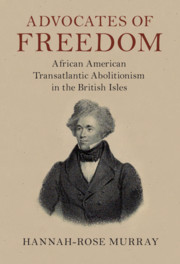'Hannah-Rose Murray’s accomplished study is a tour-de-force of scholarly research that challenges our understanding of transatlantic African American abolitionists by presenting original insights about their impact on British audiences and evolving print and performance cultures.'
Barbara McCaskill - Professor of English and author of Love, Liberation and Escaping Slavery: William and Ellen Craft in Cultural Memory
'Advocates of Freedom is a thoroughly researched, clearly written, interdisciplinary study of transatlantic African American abolitionists. Based on a mind-bogglingly extensive mapping project that showcases new and radical speech-making and performances, it will profoundly alter our perceptions of nineteenth century Black Atlantic culture and history.'
Alan Rice - Professor in English and American Studies, University of Central Lancashire, Preston
'Murray’s work maps the abolitionist and anti-lynching activism of African American men and women in Britain within those cartographies of freedom made possible by their self-emancipatory work. She identifies performance and print culture as vehicles of resistance in the struggle against slavery and the violent racism that both accompanied it and its legacy.'
Fionnghuala Sweeney - University of Newcastle
‘… a marvelous recovery of the panoply of events, networks, strategies, performances, and tropes that abolitionists employed to convince and capture audiences abroad. In a wealth of detail drawn from local newspapers, Murray examines and deconstructs the ‘performative strategies’ of a variety of Black abolitionists - performances, she notes, that were created and managed out of the experience of slavery engaging with the expectations and preconceptions of white European audiences.’
J. A. Jaffe
Source: CHOICE
‘Murray’s book is excellent, an important and richly detailed contribution to the history of British abolitionism and popular culture.’
Padraic X. Scanlan
Source: Victorian Studies





